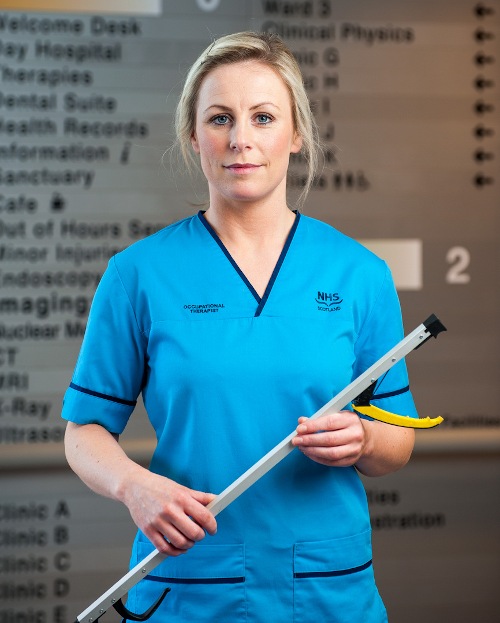Occupational Therapy for Rheumatology
Related Content
What is Occupational Therapy?
“Occupational therapy helps you live your best life at home, at work – and everywhere else. It’s about being able to do the things you want and have to do. That could mean helping you overcome challenges learning at school, going to work, playing sport or simply doing the dishes. Everything is focused on your wellbeing and your ability to participate in activities”. (Royal College of Occupational Therapists, 2024).
How are patients referred to Occupational Therapy?
Referrals are accepted from the Rheumatologist, Rheumatology Nurse Specialist or Rheumatology AHP colleagues. These will be prioritised in order to identify patients who require urgent OT intervention to reduce risk and those who can wait for a routine appointment.
What should I expect from my appointment?
Initially patients will have a short telephone triage appointment. This is to discuss how their symptoms affect them in their daily life. If a follow-up appointment is required, this will then be arranged. Rheumatology Occupational Therapists hold clinics in the three acute hospitals and also offer virtual appointments online via a video call, using NHS Near Me. An out-patient appointment with the Rheumatology Occupational Therapist will last approximately 1 hour. Patients are often asked to complete a functional assessment form, which will be sent out with the appointment letter, and complete it ahead of their appointment as this will help identify any difficulties that patients may be experiencing with activities of daily living in the areas of self-care, productivity and leisure.

Self-care
This includes personal care tasks such as toileting and dressing; functional mobility such as walking and bed transfers and community management such as grocery shopping and driving.
Productivity
This includes paid/unpaid work; looking after children and household management such as food preparation and general household activities.
Leisure
This includes hobbies/interests such as reading and sport/exercise as well as socialisation tasks such as using a telephone.
What Treatment can a Rheumatology Occupational Therapist provide?
Fatigue Management
Fatigue is a feeling of weariness, extreme tiredness which can affect you both physically and mentally. Some patients who have been seen on a one-to-one basis by the Rheumatology Occupational Therapist may also benefit from attending the Fatigue Management Programme.
Further information can be found at:
Joint Protection
These are techniques which can be adopted to reduce aches, pain and strain on your joints
Further information can be found at:
Home Visits
The Rheumatology Occupational Therapist may want to carry out an environmental analysis by suggesting that they, or the Occupational Therapy Assistant Practitioner, visit the patient at home. https://www.versusarthritis.org/about-arthritis/living-with-arthritis/your-home/
Assessing the home environment can also be arranged, often more quickly, using ‘Near Me’ technology. This also lessens the spread of infectious diseases and, as it reduces staff travel time, is better for the environment too.
Vocational Rehabilitation
For many Rheumatology patients, work is an essential activity and the Occupational Therapist can provide information and support to help individuals manage their health at work or return to work after illness. Further information can be found at https://www.versusarthritis.org/about-arthritis/living-with-arthritis/work/ or through our Health and Work leaflet.
Splinting and Hand Exercises
Splints are rigid or flexible devices which assist in maintaining the position of your hand or wrist to ease strain or pain.
The Occupational Therapist may provide you with a specific hand exercise programme. An example of a simple programme of exercises can be found on the NHS Inform website.
Referrals to Other Services
If you are experiencing difficulties with activities in your home, people who live in North Lanarkshire may find useful information at makinglifeeasier.org.uk and those who live in South Lanarkshire can find impartial advice about equipment to help make daily living easier at: https://equipu.livingmadeeasy.org.uk/
The Rheumatology Occupational Therapist will regularly refer to the Community Occupational Therapist in the local Social Work Department, or to other Allied Health Professional colleagues in Physiotherapy, Podiatry and Orthotics.
Emotional Support
Even if an individual is not experiencing any difficulties at present, the Rheumatology Occupational Therapist can still provide advice and make recommendations to help limit the impact that the Rheumatic condition may have on day-to-day tasks in the future.
People who may be experiencing symptoms of stress and low mood, as well as people who want to feel better in themselves and in their life, can benefit from activities and services that we know can improve well-being. Further information about North and South Lanarkshire’s Well Connected programmes can be found at elament.org.uk/self-help-resources/well-connected-programme.
Contact Us
If you wish to speak to someone in the Rheumatology Occupational Therapy Department, please call us on 01698 366421.
For further information on Occupational Therapy, please visit:
Your Feedback – comments, concerns and complaints
NHS Lanarkshire is committed to improving the service it provides to patients and their families. We therefore want to hear from you about your experience. If you would like to tell us about this please visit our feedback page.

